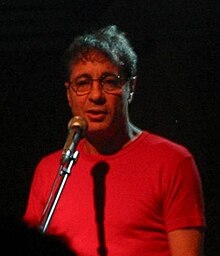| Revision as of 11:51, 28 January 2018 editReenem (talk | contribs)Extended confirmed users42,840 edits →BiographyTags: Mobile edit Mobile web edit← Previous edit | Revision as of 14:27, 6 February 2018 edit undoBabel fish (talk | contribs)339 editsNo edit summaryTag: Visual edit: SwitchedNext edit → | ||
| Line 99: | Line 99: | ||
| Much of Geffen's success came from his works for children, like the song "HaYalda Hachi Yafa BaGan" and the book "HaKeves HaShisha Asar" , but he has also written many popular songs, poems, plays, and stories for adults. He frequently collaborated with ], rendering Spanish songs into Hebrew. | Much of Geffen's success came from his works for children, like the song "HaYalda Hachi Yafa BaGan" and the book "HaKeves HaShisha Asar" , but he has also written many popular songs, poems, plays, and stories for adults. He frequently collaborated with ], rendering Spanish songs into Hebrew. | ||
| In February 2018, Geffen published a poem on his ] feed that ended with the following lines:<ref> (Instagram)</ref> | |||
| {| class="wikitable" | |||
| |{{lang|he|את , אהד תמימי, | |||
| אדומת השיער , | |||
| כמו דוד שסטר לגולית , | |||
| תהיי באותה שורה עם | |||
| ז'אן דארק , חנה סנש ואנה פרנק.}} | |||
| |Oh, ] | |||
| The redhead | |||
| Like David slapped Goliath | |||
| You will be immortalized along with | |||
| ], ] and ] | |||
| |} | |||
| Reacting to this, defense minister ] demanded that Israel’s popular Army Radio ban Geffen’s work, and culture minister ] said Geffen was "crossing a red line by someone seeking to rewrite history." Geffen published an apology but didn't remove the poem from his Instagram feed.<ref>Louis Fishman: What Happens When an Israeli Poet Compares Ahed Tamimi to Anne Frank. In: ], 6 February 2018.</ref> | |||
| ==References== | ==References== | ||
Revision as of 14:27, 6 February 2018
You can help expand this article with text translated from the corresponding article in Hebrew. (August 2015) Click for important translation instructions.
|
| This biography of a living person needs additional citations for verification. Please help by adding reliable sources. Contentious material about living persons that is unsourced or poorly sourced must be removed immediately from the article and its talk page, especially if potentially libelous. Find sources: "Yehonatan Geffen" – news · newspapers · books · scholar · JSTOR (November 2014) (Learn how and when to remove this message) |
| Yehonatan Geffen | |
|---|---|
 | |
| Born | (1947-02-22) February 22, 1947 (age 77) Moshav, Nahalal |
| Nationality | Israeli |
| Occupation(s) | Author, poet, songwriter, journalist, and playwright |
| Spouse | Nurit |
| Children | Aviv Geffen, Shira Geffen, and Natasha Geffen |
| Relatives | nephew of Moshe Dayan |
Yehonatan Geffen (Heb: יהונתן גפן; born on February 22, 1947) also known as Yonatan Gefen, is an Israeli author, poet, songwriter, journalist, and playwright.
Biography
Geffen was born in moshav Nahalal. He is the father of Aviv Geffen, Shira Geffen and Natasha Geffen, as well as nephew of Moshe Dayan. He has two grandsons.
In 1965, he served as a paratrooper under Matan Vilnai, and became an officer.
In 1967, his mother overdosed on her medication and died. Geffen considers it to have been suicide.
After his discharge from the IDF in 1969 and moving to Tel Aviv, he took up poetry.
In 1972, while Geffen was studying in London, his sister Nurit committed suicide, causing him to return to Tel Aviv.
During this period he began writing a column for the weekend supplement of Ma'ariv, and he joined the entertainment troupe "Lul" with Uri Zohar, Arik Einstein, and Shalom Hanoch. The latter introduced Geffen to his future wife, Nurit Makober.
Geffen was often criticized for his strong left-wing leanings, which bordered on provocation, and even received death threats. He was one of a group of journalists (including Uri Dan, Yeshayahu Ben Porat, Eitan Haber, Hezi Carmel, Eli Landau, and Eli Tavor) who in 1973 published the book The Failure, the first book to document the Yom Kippur War. It criticized the performance of the government and military and also contained first-hand descriptions of battles, casualties, injuries, and the losses and failures of military hardware. The book aroused considerable public interest.
Much of Geffen's success came from his works for children, like the song "HaYalda Hachi Yafa BaGan" and the book "HaKeves HaShisha Asar" , but he has also written many popular songs, poems, plays, and stories for adults. He frequently collaborated with David Broza, rendering Spanish songs into Hebrew.
In February 2018, Geffen published a poem on his Instagram feed that ended with the following lines:
את , אהד תמימי, אדומת השיער , כמו דוד שסטר לגולית , תהיי באותה שורה עם ז'אן דארק , חנה סנש ואנה פרנק. |
Oh, Ahed Tamimi
The redhead Like David slapped Goliath You will be immortalized along with |
Reacting to this, defense minister Avigdor Lieberman demanded that Israel’s popular Army Radio ban Geffen’s work, and culture minister Miri Regev said Geffen was "crossing a red line by someone seeking to rewrite history." Geffen published an apology but didn't remove the poem from his Instagram feed.
References
- Moore, Deborah Dash; Gertz, Nurith (2012). The Posen Library of Jewish Culture and Civilization, Volume 10: 1973-2005. Yale University Press. p. 375. ISBN 9780300135534. Retrieved 9 September 2016.
- את , אהד תמימי ... (Instagram)
- Louis Fishman: What Happens When an Israeli Poet Compares Ahed Tamimi to Anne Frank. In: Haaretz, 6 February 2018.